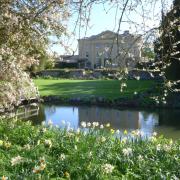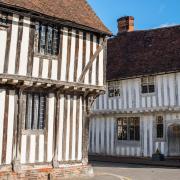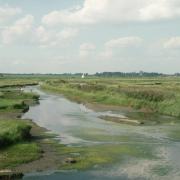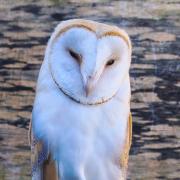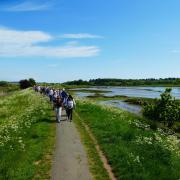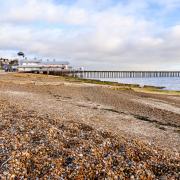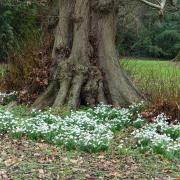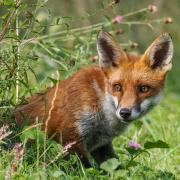Michael Morpurgo, one of the country’s best loved authors, will be talking about his latest work at Literary Ipswich, October 2-6. he chats to Wayne Savage

You’re coming to Literary Ipswich on October 3 to talk about your work in general. What can the audience look forward to and what are you looking forward to most?
I’m looking forward to meeting my readers and to reading which I love doing, and to hearing their questions.
Two days later you turn 70 – have you some special celebrations planned?
Yes, with family, some of whom, strangely, have their birthday on the same day.
A milestone like that is often a time of reflection. Looking back on your life, your career, what stands out?
Great good fortune, the benefits of longevity and, I suppose, how grand it is to have spent most of one’s life doing something I love to do.
Your most recent book, A Medal for Leroy, is being published in paperback this autumn along with a retelling of the classic tale of Pinocchio and a new short story collection, A Life in Stories. What can you tell us about those?
A Medal for Leroy was inspired by the story of the first black officer Walter Tull who, despite extraordinary bravery in the First World War, never received a medal. The stories are published for my birthday, along with extracts from some of my books. Pinocchio is the story of the famous boy puppet told in his own words. Definitely not Disney, and beautifully illustrated by Emma Chichester-Clark. I hope my readers will like them.
You’ve penned more than 120 books including The Butterfly Lion, Why the Whales Came, The Mozart Question, Shadow, War Horse and Private Peaceful. How do you remain so prolific a writer?
It’s just as important to have lived an interesting life as to write about it. In fact, for me you can’t do one without the other. The more places I go, the more people I meet, the more fascinating the world becomes. There is always a well of experience that the writer draws inspiration from. I couldn’t do it if I sat in a room and simply made it up.
You were appointed Children’s Laureate in 2003. A wonderful accolade in itself – was it more special as I believe it was while a primary school teacher in your 20s that you discovered your talent for storytelling?
Being appointed Children’s Laureate was indeed an honour and a role that I loved doing. I spent my time travelling the country, meeting people and telling stories and hearing their stories. I went into teaching at the beginning, not out of any great sense of mission, but simply because it was a job that I thought I could do quite well, and that I might like. It was also a way of earning a living. It turned out that I liked it immensely, and I discovered I could in fact, really communicate with the children in my class, in a meaningful way. I discovered, after a while, and after much experimentation, that there was only one way I could be sure of having their total attention, and that was by reading to them. And it was from reading one day to my class that I realised that the book I was reading them was boring them. My wife suggested that the next day I should tell them one of my own stories. I did this and they seemed to love it, so I decided to write them down.
Was it then you knew you wanted to be a writer?
It certainly gave me the confidence to think I could have a go.
I read a quote; and I don’t know if it’s true, where you said: “I could see there was magic in it for them (the children), and realised there was magic in it for me.” How do you feel when you write, see your work published and more importantly see people reading it?
The greater part of my work is dreaming. Dreaming my stories up in my head. Turning them into books means that you share your dreams with other people and wonderfully they can make of your dreams what they will, bringing their own meaning and imagination to what you have tried to create.
Your stories are based on truth, but with what you call “dreamtime”. How much of you, your life, is in your work?
Hugely. My own memories are the basis for many of my stories, my memories of childhood, and if not my memories then other peoples.
Private Peaceful was mostly shot in Ipswich’s Christchurch Mansion. I read in, I believe the Radio Times, that you were unhappy with decision not to shoot it in Devon?
Private Peaceful is set in Devon and it is the Devon landscape and architecture that I imagined so it would have been lovely if it could have been filmed there. But it is the nature of filming and always the nature of plays that landscapes change. That’s not to say that Suffolk isn’t every bit as beautiful as Devon.
The stage adaptation of The Butterfly Lion played in the region recently. What’s it like seeing your work, which until then only existed in your imagination, brought to life on stage?
Every production on stage or on screen is a way of shining a new light on a story, having someone else tell it in their own way. This can be wonderful and exciting, but it can equally be sometimes disappointing. I know with the Butterfly Lion that it’s a wonderful production, sensitively adapted and beautifully played as were War Horse and Private Peaceful.
I read it was informed by your unhappy experiences at boarding school?
It’s true that I ran away from boarding school when I was seven. That episode is true in the Butterfly Lion. But I was no unhappier than anyone else at my boarding school. We all would rather have been at home than at school. That was the problem I suppose.
I believe your many influences included Ted Hughes, who went on to become a friend, mentor and neighbour?
And Robert Louise Stevenson, who sadly was not a neighbour and I never met. We get to know the writers we admire and love, mostly through their books and that was true of Ted Hughes too.
Recurring themes in your work include the triumph of an outsider, survival – why is that?
Maybe to a greater or lesser extent we all feel alone and sometimes an outsider and it’s a struggle to hang in and keep going. When we do it’s a triumph.
You and your wife established the charity Farms for City Children which has been an amazing success. What sparked that?
It was after my wife, Clare and I were both teaching in a primary school in Kent. We felt as their teachers that we were enabling some of them to get the best out of their time at school. But the others were failing. Some of these children were on a road to nowhere, and most of them were beginning to know it already, beginning to resent school and to give up. We began to try to work out how this situation might be changed. We felt that what children needed most was to feel needed, and this had to happen young. So rather idealistically, naively, we moved from Kent to Devon. With money left to Clare by her father, Allen Lane who began Penguin Books, we bought a farm, a large Victorian manor house, and set up a charity. A year or so later the first children came from Birmingham. They would become the farmers and spend a full working week on the farm, whatever the season and the weather – milking, feeding sheep, moving them, lambing them, feeding pigs, hens, geese, ducks, turkeys, mucking the animals out, bedding them down, feeding them, caring for them. It is hard work, real work, but they know their work is essential and important, that it matters to the animals, to the farm. And that they matter.
I must ask you about War Horse, which has evolved into a West End show and Steven Spielberg film. How do you feel about its success? Did you visit the set, meet the actors, have input into its production?
Well, it’s been an incredible journey. I sometimes have to pinch myself to see if it is real. Recently, the National Theatre brought Joey, the puppet home to Iddesleigh, my village in Devon where it all started, where I was originally inspired to write the story. It was an incredible experience to have Joey there – over a thousand people turned out to welcome him on a lovely sunny day, with the local band playing and children from nearby schools. Joey has come a very long way since the National Theatre first approached me about the book. At the beginning, I have to confess, I was sceptical. How on earth, could a convincing drama of the First World War be made using life-size puppets of horses? For a year or more the incredible directors Tom Morris and Marianne Elliot workshopped the story to explore how it could be done, and the result has been one of the greatest anthems for peace I have ever seen. For me there has to be a certain amount of trust and I’ve been lucky that my book has been taken up by such talented individuals. I knew that I could trust them to create something wonderful. The company do ask me for advice and I speak to the new cast and talk to them about the book and about Devon whenever I can. Again, with the film I was lucky. This was Spielberg. one of the greatest directors of all time and a truly great storyteller. I trusted him with my story.






